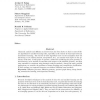Free Online Productivity Tools
i2Speak
i2Symbol
i2OCR
iTex2Img
iWeb2Print
iWeb2Shot
i2Type
iPdf2Split
iPdf2Merge
i2Bopomofo
i2Arabic
i2Style
i2Image
i2PDF
iLatex2Rtf
Sci2ools
154
click to vote
JMLR
2008
2008
Regularization on Graphs with Function-adapted Diffusion Processes
Harmonic analysis and diffusion on discrete data has been shown to lead to state-of-theart algorithms for machine learning tasks, especially in the context of semi-supervised and transductive learning. The success of these algorithms rests on the assumption that the function(s) to be studied (learned, interpolated, etc.) are smooth with respect to the geometry of the data. In this paper we present a method for modifying the given geometry so the function(s) to be studied are smoother with respect to the modified geometry, and thus more amenable to treatment using harmonic analysis methods. Among the many possible applications, we consider the problems of image denoising and transductive classification. In both settings, our approach improves on standard diffusion based methods.
| Added | 13 Dec 2010 |
| Updated | 13 Dec 2010 |
| Type | Journal |
| Year | 2008 |
| Where | JMLR |
| Authors | Arthur D. Szlam, Mauro Maggioni, Ronald R. Coifman |
Comments (0)

